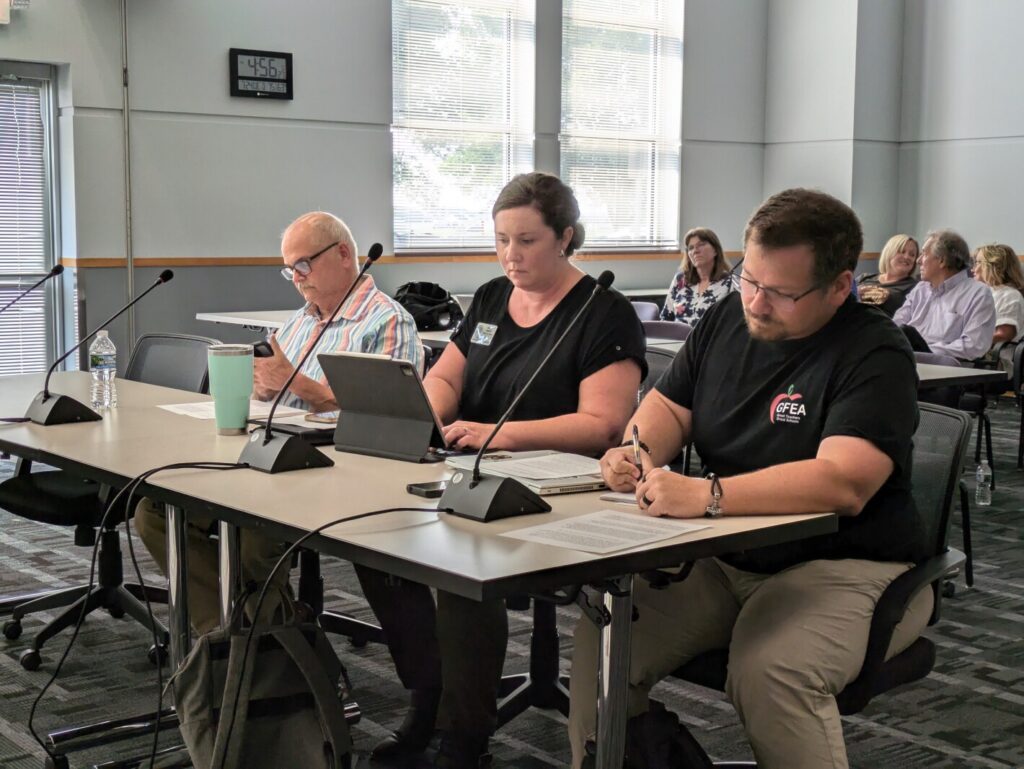GRAND FORKS – Special educators in Grand Forks Public Schools are at a crisis point, according to the vice president of the teachers union.
District schools are short-staffed and teachers are working larger case loads than they can handle, said Joe Drumm of the Grand Forks Education Association.
“They’re burnt out. We’re dealing with individuals who have been doing this for 10 or 15 years who are ready to walk away if a solution can’t be met,” Drumm said late Monday.
Drumm’s remarks were prompted by a meeting with a team of special education teachers at an elementary school Monday. He declined to name the school, citing widespread concerns among educators about retaliation.
Special education is chronically underfunded in Grand Forks and across the nation, and has attracted concern in the past from both the teachers union and Grand Fork Public Schools’ leadership.
In response to a Herald query about Drumm’s remarks, district Communications and Marketing Manager Melissa Bakke released the following statement: “At Grand Forks Public Schools, we remain committed to supporting our students and staff in the Special Education department and in all departments. We recognize the challenges many districts are facing, and we are actively working in creative and unique ways to bring in additional staff to fill open positions.
“We are working diligently to support our special educators, which includes our teachers, paraeducators, and related service providers. Our goal is to ensure that all students continue to receive the high-quality services they deserve, and we are grateful for the dedication of our GFPS team during this time.”
Drumm said the teachers he spoke to reported working in excess of their prescribed case loads and with minimal help from paraprofessionals due to absences, resulting in teachers having to work through their prep time and lunch.
He said the teachers told him they believe the majority of elementary school special ed programs are facing similar circumstances.
“The district administration is saying, ‘we’re looking into it, we’re trying to assess and come up with solutions,’ but the solutions aren’t coming,” Drumm said. “We’re looking at a serious breakdown of support.”
Teachers have an avenue to receive additional compensation for missed prep and lunch time, but only a handful were filling out the forms necessary to do so due to a lack of understanding.
“Unfortunately, the profession is built on the back of martyrs, and a lot of people just do it because that’s what they need to do,” Drumm said.
Business Manager Brandon Baumbach told the Herald that 47 special education teachers were paid an additional $54,165 in Teacher Coverage last year, equivalent to an additional 1,288 hours of work.
Drumm’s remarks, particularly his statements about case loads and lost prep time,
echo concerns expressed by members of a special committee
of administrators and GFEA members set to review the workload placed on those teachers.
That committee is charged with producing a report on teaching conditions for special educators ahead of contract negotiations this spring. It met most recently on Sept. 30.
The GFEA vice president was also critical of that committee, saying the union’s efforts had not been matched by the district and citing the year that passed between a memorandum of understanding signed as part of 2023’s negotiations and the committee’s first meeting in May.
“As a negotiating body, we don’t have an appetite to look into MOUs in the future,” Drumm said.
Committee chair Griffin Gillespie was out of the office this week for a conference, and did not respond to an emailed request for comment Wednesday.
“The work of that committee is not done,” School Board President Dave Berger said on Thursday. “It appears they’re doing the work in order to prepare a report for the negotiation cycle, and I’d like to see that work continue and complete.”
Berger is not a member of the workload committee, but was one of the representatives for the School Board during 2023’s contract negotiations.
Special education programs across the country have been chronically underfunded since President Gerald Ford signed the Individuals with Disabilities Education Act into law in 1975.
IDEA authorized federal funding for 40% of per-pupil spending, but the federal government has never funded more than 18% of national special education costs.
Increasing special education funding at the state level is expected to be
one of the policy goals pursued by the school district’s newly-formed government affairs committee
ahead of next year’s legislative session.
At Monday’s School Board meeting, Superintendent Terry Brenner reiterated he planned to call for more state special education funding. (Brenner, who is also out of the office for a conference for much of this week, did not respond to an emailed request for comment Wednesday.)
Berger also reiterated the importance of state funding and said it would go a long way toward deciding what solutions the district could provide.
He pointed the Herald to the Special Education Unit’s welcoming statement, which outlines the district’s commitment to serving all students’ needs.
“We remain committed to providing all of the appropriate services, depending on the individual needs of the student,” he said. “We’re also committed to a place where all teachers accept and meet that challenge of enhancing the learning of all students. So we get there together.”
On Monday, the School Board
voted to impose thousands of dollars in damages
on a special educator at Valley Middle School who resigned — and broke her contract with the district — due to the impact of her job on her physical and mental health.
Two members, Jay Kleven and Amber Flynn, cast votes opposing the board action.

